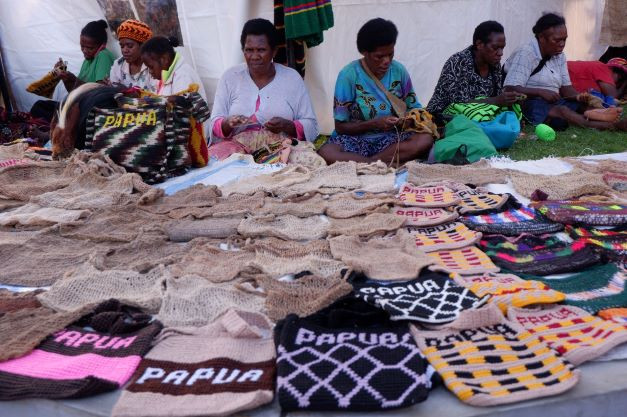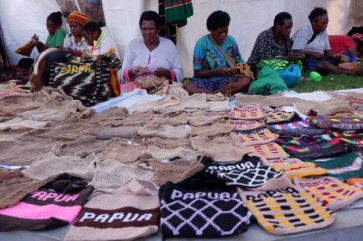Popular Reads
Top Results
Can't find what you're looking for?
View all search resultsPopular Reads
Top Results
Can't find what you're looking for?
View all search resultsStepping out of the long shadow of the economy
As women tend to work with limited capacity, skills or funding, they stand a little chance of advancing in their careers or business.
Change text size
Gift Premium Articles
to Anyone
 Weaving resilience: Local women weave handbags during an exhibition of micro, small and medium-sized enterprise (MSME) products at Cenderawasih Sports Hall in Papua on Aug. 23, 2022. To support the Love Indonesian Products movement, Bank Indonesia invited 60 MSME players to the event, which lasted until Aug. 27. (Antara/Sakti Karuru)
Weaving resilience: Local women weave handbags during an exhibition of micro, small and medium-sized enterprise (MSME) products at Cenderawasih Sports Hall in Papua on Aug. 23, 2022. To support the Love Indonesian Products movement, Bank Indonesia invited 60 MSME players to the event, which lasted until Aug. 27. (Antara/Sakti Karuru)
-cd
Please check the highlighted sentence. The figure doesn’t quite make sense to me in the context of the paragraph.
Informality in the economy increases during crises, including in Indonesia when the pandemic struck in 2020. These so-called hidden economies, however, are associated with limited skills, low productivity, a high incidence of poverty and a decent work shortage. And in most emerging markets like Indonesia informal jobs are more prevalent among women.
As global uncertainty persists with an elevated risk of economic downturn, a pervasive shadow economy haunts inclusive recovery, calling for a policy package to address the complexity of informality that encourages a transition from a shadow to a licit economy.
There is a widely accepted notion that women are the backbone of Indonesia's economy. This is due to the fact that women dominate the micro, small and medium-sized enterprises (MSMEs), which account for around 62 percent of GDP, or about Rp 8.6 trillion (US$580 billion) and absorb about 90 percent of total workforce. More than half of the 64 million SMEs in Indonesia are women-owned businesses, but most of them are in the micro and small sector and operate informally.
In 2020, informal workers accounted for 60.47 percent of the labor market, up by 5 percent from 55.72 percent in 2019. During this period, the share of women in the informal sector surged from 41.97 percent to 57.35 percent. From self-employed workers in MSMEs such as market vendors and hawkers, to wageworkers like domestic workers and home-based workers, women were overrepresented in informal labor.

















